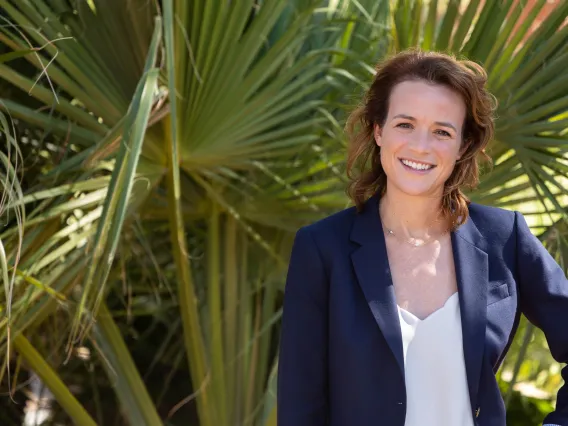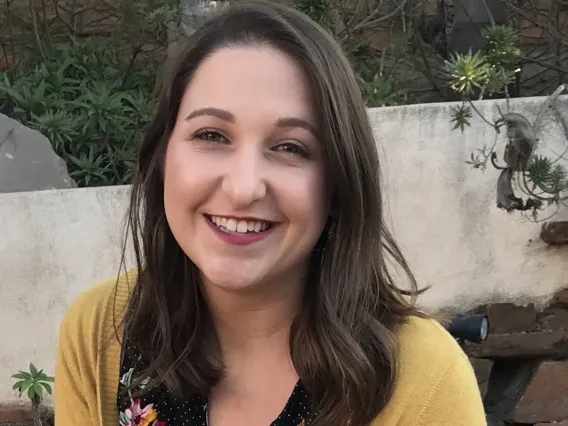Faculty Research and Labs
Discover our ongoing collaborative interdisciplinary research and how it advances veterinary medicine and the education field.

Dr. Maggie O'Haire
Dr. Maggie O’Haire is an internationally recognized Fulbright scholar. She is the Associate Dean for Research and Professor for the University of Arizona College of Veterinary Medicine. She earned her PhD in Psychology from the University of Queensland, Australia. Her research program focuses on the unique and pervasive ways that humans interact with animals. From household pets to highly trained service animals, her findings have been instrumental in demonstrating the impact of human-animal interactions. Most recently, she was named as a 2023 University of Arizona Woman of Impact.

Dr. Evan MacLean
Evan MacLean is an Assistant Professor at the University of Arizona, where he holds appointments in Anthropology, Veterinary Medicine, Psychology, and Cognitive Science. He is the founder and Director of the Arizona Canine Cognition Center. Dr. MacLean received his Ph.D. in Evolutionary Anthropology from Duke University.

Dr. Emily Bray
Dr. Emily Bray is an Assistant Professor in the College of Veterinary Medicine. She earned her BA in Psychology from Duke University and her PhD in Psychology from the University of Pennsylvania. Her research, often conducted in collaboration with working dog organizations, focuses on how animals think, behave, and problem solve over their life course. By building a comprehensive understanding of dog behavior and cognition, we can enhance both canine health and welfare and our human-animal interactions.

Dr. Kerri Rodriguez
Dr. Kerri Rodriguez is an Assistant Professor in the College of Veterinary Medicine. She earned her BS in Evolutionary Anthropology and Biology from Duke University, her MS in Marine Mammal Science from University of St Andrews, and her PhD in Human-Animal Interaction from Center for the Human-Animal Bond at Purdue University. After her PhD, she completed a postdoctoral research fellowship with the Human-Animal Bond in Colorado at Colorado State University. As the director of the HAB (Human-Animal Bond) lab, her research explores the role and impacts of the human-animal bond for human and animal health and wellbeing across a variety of settings, populations, and contexts.

Dr. Martin Reimann
Martin Reimann, Ph.D., is a trained psychologist and an associate professor at the College of Veterinary Medicine. Some of his work deals with how people form, maintain, and dissolve social relations with other humans and their pets. One project studies the unconditional love animal companion can provide their owners with. Consumers turn to companion animals in times of distress, often equating the role of their pet to that of a close friend or family member. However, we still know little about how much relationships with pets buffer against psychological pain or the mechanisms behind this. Across three experiments (N = 1,582), we evaluated the effects of thinking of a beloved animal companion on the experience of psychological pain. Across all three studies, such thoughts decreased perceptions of psychological pain compared to control conditions. Surprisingly, thinking of a beloved pet was more effective at buffering psychological pain than thinking of a beloved person, an effect mediated by perceptions of unconditional love. Our findings highlight how emotional bonds with pets may protect against psychological adversity and point to the key role played by perceptions of unconditional love in this process.
Dr. Elaine Norton
Dr. Elaine Norton focuses her extensive research on the heritability of equine metabolic syndrome in various breeds of horses and how that relates to the risk of endocrinopathic laminitis - which makes up 80-90% of laminitis cases. This discussion focuses on her study with Welsh ponies and Morgan horses but also breaches into her new research involving Arabian Horses and more.
Dr. Netzin G. Steklis
Dr. Netzin Steklis is an Assistant Professor of Practice at the School of Animal & Comparative Biomedical Sciences and the University of Arizona. Her higher education reflects her multidisciplinary interests in human and non-human animal behavior: She holds a B.A. in Anthropology (Biology emphasis) from the University of Chicago, an M.A. in Ecology and Evolutionary Biology from Princeton University, and a Ph.D. in Ethology & Evolutionary Psychology from the University of Arizona. She has expanded her research and academic focus to include the biopsychology of human-animal interrelationships. This growing interest in Human-Animal Interaction (HAI), and the realization of a need for well-controlled research studies, also led to the co-founding and co-directing 2014 of the Human-Animal Interaction Research Initiative (HAIRI) at the University of Arizona. HAIRI aims to train undergraduate and graduate students to evaluate reported claims in HAI by engaging them in all stages of research on HAI projects.
Dr. Horst D Steklis
H. Dieter Steklis earned his Ph.D. in Anthropology in 1974 from the University of California, Berkeley. He joined Rutgers University in 1974, serving as Professor of Anthropology until “retiring” in 2004 as Professor Emeritus of Primatology. Steklis served the University of Arizona South from 2007-2016 as Associate Dean, Division Chair, and Professor and Program Director for Anthropology and Psychology. Presently, he serves as Professor of Practice in the School of Animal and Biomedical Sciences, with affiliated appointments in Psychology, Program in Ethology and Evolutionary Psychology, and Family Studies and Human Development. Steklis’ teaching, research, and published books and scientific articles reflect multidisciplinary interests, including the neurobiology of primate social bonds, hormones, and social behavior, primate communication, cognition and the evolution of human language, mountain gorilla behavior, personality, and conservation, the evolution of primate play and paternal behavior, and the evolution and nature of human-animal relationships. In addition to his academic career, Steklis held leadership positions with the Dian Fossey Gorilla Fund International a nonprofit organization dedicated to gorilla research and conservation in Africa.
